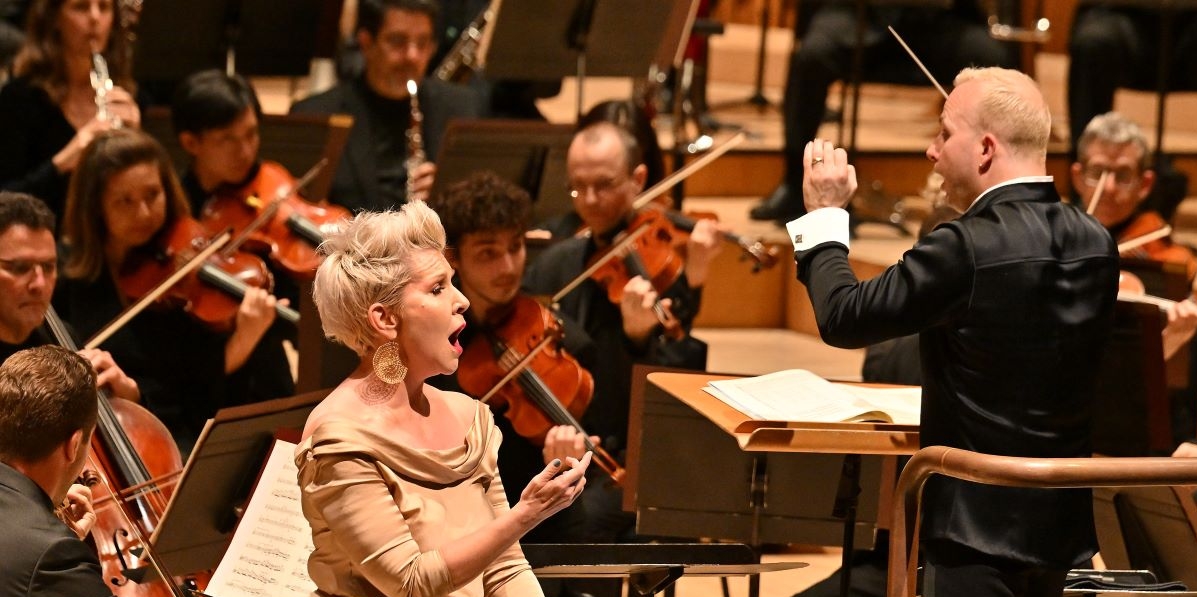It has been 20 years since the Met Orchestra have appeared in UK. This performance to a packed Barbican Hall was part of an international tour. There was a real buzz in the auditorium, rare for a concert. Having conducted a performance in Paris the two previous evening, the Met Orchestra are bound for Baden-Baden for another two concerts.
Paris and Baden-Baden are treated to two different concerts. London was given a fusion of both. This concert was ‘to celebrate the genius of Shakespeare in musical form’.
Conductor Yannick Nézet-Séguin is a tour de force. The physicality he injects into the orchestra as if he is a conduit for the music which enters his baton and exits as balletic electricity is a wonder to behold. He practically leaves the ground. Occasionally the music is almost suspended. It is exciting to hear an orchestra of the Met’s high standard, being ‘let out of its cage’, because it usually in a sunken opera pit. The sound emanating from Nézet-Séguin’s baton was overwhelming.
He has radically changed the Met ‘from the bottom up’ since the years of James Levine, and has already changed the Met Opera’s repertoire adding more contemporary music, thereby dispelling the view that opera is a dead art form. He died his hair blonde, swapping the conductor’s traditional tuxedos outfits made by the Met costume department. This evening he wore black satin and hugged everyone.
The first item, Tchaikovsky’s Fantasy-Overture Romeo and Juliet is auto-biographical, inspired by Tchaikovsky’s only heterosexual affair with a Belgian soprano, Désirée Artôt. Tchaikovsky was infatuated by her gracefulness of movement. It is a powerful, yet tormented opener.
Matthew Aucoin Heath (King Lear Sketches) followed. It is an 11-minute work of four sections, each with their own character. The tolling bells in the opening, reminiscent of Mussorgsky/Rimsky-Korsakov, conjure agitated chaos, broken up by the Fool’s jittery music. Accoin was present and delighted with the applause.
Hector Berlioz excerpts from Les Troyens we were told, borrows themes from The Merchant of Venice, although I cannot fathom which. The tenuous Shakespeare link is irrelevant, as it serves to introduce superstar Joyce DiDonato in muted gold. As always, she is a classy performer, committed to her music. Chers Tyrians is her call to arms, but it is the intensity, fury and broken fragility she brings to ‘Adieu, fière cité’ as the Queen betrayed and abandoned by Aneas, that shows the consummate artist. Her phrasing and breath control were superb, as was the last word ‘finie’ on a fil di voce. DiDonato sang a short encore – Strauss’s Morgen.
The second half is the final act of Verdi’s Otello. The orchestra shined, as Nézet-Séguin brought out the poignancy and savagery of the score. Soprano Angel Blue (replacing Reneé Fleming) looked resplendent in a glittering turquoise dress. Her voice is rich and generous, and the ‘salce’ (willow) scene was sung with intense desperation. Deborah Nansteel as Emilia has a rich mezzo, and there was strong chemistry between them. Tenor Russell Thomas gives a really strong performance as Otello goes through the gamut of emotions – broody, jealous, furious, and finally desolate.
This brought the concert to a powerful end, but people wanted more. So Nézet-Séguin left us with his message of introducing newer pieces, and treated us to an ‘unjustly overlooked’ piece by Florence Price written in 1951 and performed by David Chan.
This was a rare evening one remembers for a long time.
One must not forget, that the Met did not pay its orchestra or chorus for almost a year during Covid, and many struggled badly. Peter Gelb, who was at this concert, voluntarily sacrificed a year’s salary.

